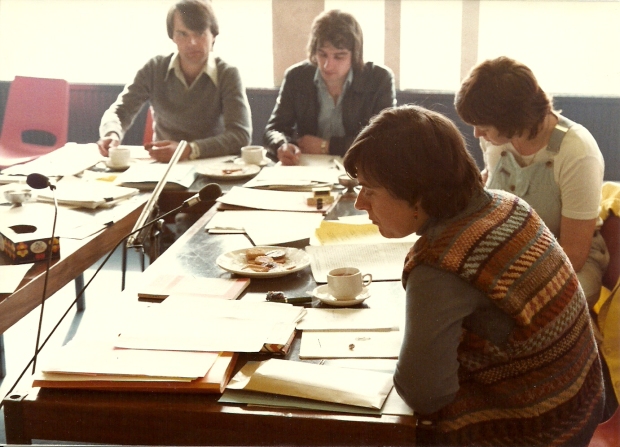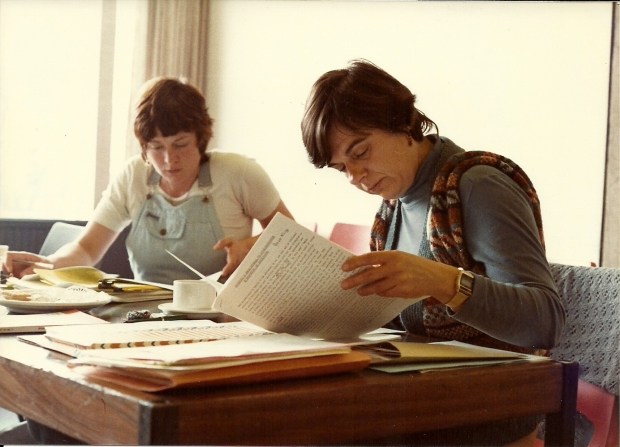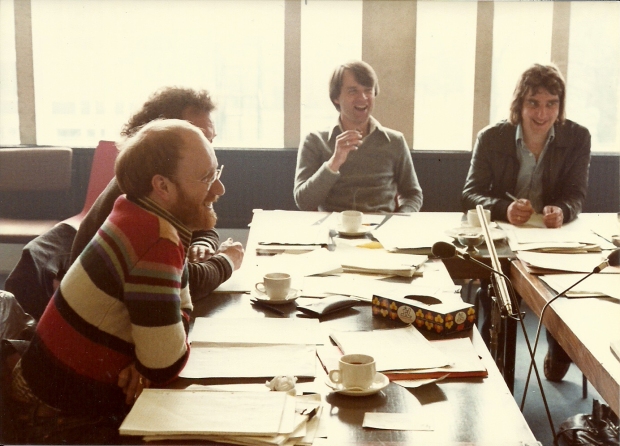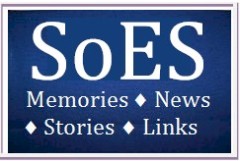Posts Tagged sexualities
The Queer/ Gay/ Sexualities Research Tradition at Essex
Posted by stories of essex sociology in Books, Former staff on April 3, 2015
One of the many fields of research in the Essex Sociology Department has been ‘sexualities’. In the 1990’s it established the journal Sexualities and in the 00’s it set up the Centre for Intimate and Sexual Citizenship run by Róisín Ryan Flood. To celebrate the 50th anniversary, a seminar was held in March 2015 to look at some of its earliest work that helped to create a new field of study – lesbian and gay studies, queer studies and critical sexualities studies – and to consider just how far it has advanced.
In the 1970’s there was almost no research in these areas and Essex was one of the pioneers. Mary McIntosh’s The Homosexual Role – which argued that homosexuality was not a universal condition but a variable social role- is often seen as a foundational text. The seminar was held in her memory, discussed her work and highlighted the earliest collective work produced in the department during the 1970’s and published in 1981 as The Making of the Modern Homosexual. This book brought together students and staff, and suggested new directions for research. Most notably it developed a historical sense of same-sex relations; linked it firmly to power, gender and identity; and developed the debate over constructionism and essentialism. While they were innovative then, many now would take these early paradigm shifts for granted as a new vibrant field of ‘sexualities studies’ has emerged over the past twenty years, moved on and developed new concerns.
The book The Making of the Modern Homosexual was organized into three parts. The first part reprinted the McIntosh article and Mary then discussed its value in an interview with Jeffrey Weeks and Ken Plummer. It suggested key features of new emerging frameworks. The second part took up three key themes: Ken Plummer suggested the fruitfulness of applying stigma theory, labeling theory and ideas of ‘oppression’ to homosexuality; Jeffrey Weeks puzzled the historiography of homosexuality and its latent essentialism; while Annabel Faraday critiqued the apparent males bias of existing ‘male’ ‘gay’ research and suggested new radical feminist baselines. The third part then provided three empirical studies being conducted by graduate students – a first (John Marshall) traced the emergence of the category from the late 19th century to the 50’s; a second (Dave King) looked at the making of ‘trans’ categories; and a third (Gregg Blachford) looked at the growing significance of ‘masculinity’ in the gay culture. Some of these contributors will be returning for the seminar and meeting again for the first time in over thirty years!
The session was very lively. Gregg Blachford had flown in from Canada to chair the session and John Marshall – who left to become editor of Gay News and gay Times for much of the 1980’a – returned to Essex for the first time in over thirty years. Annabel Faraday sent a message saying she had left academia for the world of ceramics and wished the seminar well. Dave King has now retired to a Welsh village where he participates in the local community shop.
The world has moved on. When Essex was established ‘homosexuality’ was still a crime and firmly defined as sickness. The Gay, Lesbian and Women’s movement had not happened and AIDS had not arrived. Over the years there have been major changes and now the university has strong policies on supporting gay, gender and transgender equality rights. The seminar ended by asking just how much has things really changed? Not as much as it looks on the surface – especially if the global stage is considered.
Here are a few photos taken at a seminar in 1980 as the authors discussed their papers.
Remembering Mary McIntosh (1936-2013)
Posted by stories of essex sociology in Former staff, Obituaries on February 11, 2013
Mary McIntosh, who was at Essex for twenty years between 1976 and 1996, died in January. Ken Plummer wrote this on his blog at the time. You can also find his fuller obituary in The Guardian and under ‘Memories’: Mary McIntosh
Goodbye Mary : We Love You
It is with very great sadness I learnt of the death of Mary McIntosh – a very dear person to me and many others – and a great inspiration. She had bounced back from very serious illness several times over the past few years; but finally it was another stroke that took her on Saturday January 5th 2013. Sad news for the start of the new year. Condolences to all her close friends but especially Ange, her long time partner, and Duncan her ‘son’.
Mary was a pioneer: a second wave feminist, an active member of the lesbian and gay movement, one of the most quietly influential of sociologists of the 1960’s through 1990’s, and a wonderful person. She also remained a committed socialist.
She was one of the greatest influences on my life. Very early on, I wrote to her as an undergraduate when she was teaching at Leicester and she sent me several of her unpublished papers on the sociology of homosexuality. These were amazing pieces and a real eye opener for me. Very shortly afterwards, one of these papers was published as ‘The Homosexual Role’ in the journal Social Problems: the rest is history. It has become one of the classical foundational arguments of the sociology of homosexuality. It gave a historical and fully social meaning to the idea of same sex relations. I was to meet her personally just a few years later at the London School of Economics- first at a seminar on ‘deviance’ for graduate students ( when I was giving my first ever paper: Changing Conceptions of Homosexuality in 1968 She was very encouraging). But later and more significantly we became friends in the very early meetings of the London Gay Liberation Front in 1970. She became a very prominent figure in this movement – with her partner of the time, Elizabeth Wilson.She was also becoming even more active in the then flourishing Women’s Movement .
Her activism bridged into a careful and thorough sociology. She had been well trained into the elements at Oxford and Berkeley, and adopted first functionalist ideas then Marxist ones ( there is really only a small (but major ideological) step between them). She became involved in establishing the new and lively group of young academic Turks studying crime- the National Deviancy Conference. She was also engaged in setting up two journals Economy and Society (1978-1994) and Feminist Review (1972-1978) where she became part of the influential first editorship and stewardship (both have gone on to become major world journals). She was also very active in the British Sociological Association.
Finally, I came to know her most of all when she arrived at Essex as a colleague at the University of Essex in 1976/7 – where she worked for the next twenty years. Academically, she straddled several fields: criminology, theory,social policy, the family, feminism, Marxism. She loved teaching and taught the first feminism and gender course in the department – hugely popular with students, but dropped when she retired. Here she was to become a key influence and the first woman ‘Head of Department’ of Sociology ( 1986-9). Sadly, and to the shame of the Essex Department, she was never promoted to the rank of full Professor. She retired in 1996.
After her retirement, she worked a little at Birkbeck College, London; but she gradually left ‘academia’ behind. She worked for some time at the Citizen’s Advice Bureau and continued her political activities. Her papers have been chronicled at the London School of Economics
Even though she did not like writing and suffered writer’s block, she published some influential works including:
- co -editor with Paul Rock of Deviance and social control (Tavistock, London, 1974);
- The organisation of crime (Macmillan, London, 1975);
- co-writer with Michelle Barrett of The anti-social family (NLB, London, 1982);
- co-writer with Lynne Segal : Sex exposed: sexuality and the pornography debate (Virago, London, 1992);
- And a host of pathbreaking articles on an array issues like of homosexuality, prostitution and family policy.
Mary was a serious intellectual and a passionate activist. A strong, caring, quiet presence – she also had a very joyful sense of fun and always ready for a dance and a laugh. I missed her greatly when she left Essex; the department could never be quite the same for me. And now she leaves a gaping hole in the world. But she will be loved in remembrance.
For Mary: The Choir Invisible
Oh, may I join the choir invisible
Of those immortal dead who live again
In minds made better by their presence; live
In pulses stirred to generosity,
In deeds of daring rectitude, in scorn
For miserable aims that end with self,
In thoughts sublime that pierce the night like stars,
And with their mild persistence urge men’s search
To vaster issues.
So to live is heaven:
To make undying music in the world,
Breathing a beauteous order that controls
With growing sway the growing life of man.
So we inherit that sweet purity
For which we struggled, failed, and agonized
With widening retrospect that bred despair.
Rebellious flesh that would not be subdued,
A vicious parent shaming still its child,
Poor anxious penitence, is quick dissolved;
Its discords, quenched by meeting harmonies,
Die in the large and charitable air,
And all our rarer, better, truer self
That sobbed religiously in yearning song,
That watched to ease the burden of the world,
Laboriously tracing what must be,
And what may yet be better, — saw within
A worthier image for the sanctuary,
And shaped it forth before the multitude,
Divinely human, raising worship so
To higher reverence more mixed with love, –
That better self shall live till human Time
Shall fold its eyelids, and the human sky
Be gathered like a scroll within the tomb
Unread forever.
This is life to come, –
Which martyred men have made more glorious
For us who strive to follow. May I reach
That purest heaven, — be to other souls
The cup of strength in some great agony,
Enkindle generous ardor, feed pure love,
Beget the smiles that have no cruelty,
Be the sweet presence of a good diffused,
And in diffusion ever more intense!
So shall I join the choir invisible
Whose music is the gladness of the world.
Some former students
9th January
Dear Ken
Saw a notice in The Guardian this morning re Mary’s passing – very saddening – just felt the need to let folk in the Department know how much I appreciated her teaching – I recall she gave all the Lectures for the 1st year core course 1981-82 – Thursday mornings if I recall correctly. Like all her students I really respected her and held her in high regard.
Steve Willis (Sociology and History 1981-84)
|
Constantinos N. Phellas, PhD 1998
Posted by stories of essex sociology in Alumni, Around the world on January 24, 2013
Susie Scott, BA Sociology 1999, MA Sociology 2000
Posted by stories of essex sociology in Alumni on October 15, 2012



I first came to Essex in 1996, as a shy 18 year old in my gap year, with the intention of filling in time before starting a Psychology degree. As my Dad (John Scott) was teaching in the department, I started hanging out in the Resource Room, with Helen Hannick and the team of student volunteers. We helped students with study skills, proof reading essays, and general support and advice. Later on, Rowena Macaulay arrived to replace Helen, and did an equally great job of building up the Resource Room and creating a student community. I had such a fantastic time there and made such wonderful friends (including fellow Essex Sociology alumni Chrissie Rogers, Paul Howell, Lynne Pettinger and Agnes Skamballis) that I decided I wanted to stay and become a sociologist instead! The department was a lovely place to be, with so many interesting people and warm, friendly staff – I felt instantly at home there. I’ll always remember the day I was coming home on the train and met Tony Woodiwiss, then Head of Department, who answered my tentative question of whether he thought there was a chance I could stay on with a wry smile and the words, “I should think that would be quite likely.”
So I studied at Essex as an undergraduate from 1996-1999 (BA Sociology) and then as a postgraduate from 1999-2000 (MA Sociology). Never looked back on that lost career as a psychologist, which I’m sure I would have sucked at. I loved every minute of my time at Essex and learned so much – I really think it was the perfect place to study Sociology, as everyone was so interested and passionate about both research and teaching. After that, I moved to Cardiff to do my PhD (2000-2003) on ‘the sociology of shyness’, which then became my trademark topic. Then in 2004, after a period of research bits and pieces and increasingly desperate job-hunting, I somehow landed both an ESRC postdoctoral fellowship and a follow-on lectureship at Sussex University, where I have been ever since.
My research interests are in self-identity, interaction and everyday life, and Sussex has allowed me to indulge my love of Symbolic Interactionist theory and Goffman’s dramaturgy in my research and teaching. I’ve carried on the shyness research through my book, Shyness and Society (Palgrave, 2007) and various articles about shyness as interactional deviance, as well as subsequent projects about lecturers’ experiences of performance anxiety, and the effects of new technologies/digital media upon shyness in contemporary art galleries. My second book, called Making Sense of Everyday Life (Polity, 2009) was about the rituals, routines and norms that shape mundane social activities, such as sleeping, eating and shopping. The other strand of my research is in the field of health and illness, where I have worked on projects about risk assessment in both cancer genetics and the contested mental health condition ‘Dangerous and Antisocial Personality Disorder’, as well as a critique of the medicalisation of shyness as Social Phobia/Social Anxiety Disorder. Reading Goffman’s famous study, Asylums, I became fascinated by the social worlds of total institutions (places where people spend 24 hours a day) and my third book, Total Institutions and Reinvented Identities (Palgrave 2011) was about how these had changed since Goffman’s time to be more about voluntary self-reinvention. More recently, I’ve done some random quirky projects about swimming pool behaviour and etiquette, and stage fright in performing artists. I am soon to begin a Leverhulme-funded study of asexual identities and practices of intimacy, with Matt Dawson (also ex-Essex) at the University of Glasgow. Finally, sticking with my Goffman/SI-obsession, the next book that I am working on is called Negotiating Identities, which has been a lot of fun to research and hopefully won’t be too painful to write. At least, I couldn’t have asked for a better foundation than having studied Sociology at Essex!
My links: I can be contacted at Sussex here: http://www.sussex.ac.uk/profiles/171734
Tony Coxon (1939-2012)
Posted by stories of essex sociology in Former staff, Obituaries on October 14, 2012
Tony Coxon was the founding director of the British Household Panel Study at the University Essex. He died on 7 February 2012.
He was the first director, from 1989, of the ESRC Research Centre that created the pioneering long-running British Household Panel Survey.
Professor Coxon was well known for his work in quantitative methods teaching and had a passion for both collecting and using empirical data. Particular areas of research included his earlier work on occupations and perceptions of occupations, research methods relating to cognitive sociology and diary methods, and later his important work on sexualities and sociology of sexual behaviour and homosexuality.
He was well known for co-ordinating the longitudinal survey of sexual behaviour, project SIGMA, one of the largest studies of gay and bisexual men in the world. SIGMA was an integral part of the WHO Global Programme on Aids’ seven-nation Homosexual Response Studies which shared research instruments with a number of U.S. and European projects. A component part of SIGMA data consists of 1,975 month-long sexual diaries kept by cohort members. Data from this Project SIGMA Essex : Socio-sexual Investigations of Gay Men and Aids, Sexual Diaries Project, 1987-1994 are available from the UK Data Archive.
Professor Coxon was an inspiration to many younger researchers all over the world, taking the time to discuss and instruct on his distinct methodological approaches. He was passionate about ensuring a legacy of quantitative methods skills for UK social science, and contributed to the ESRC’s recent take up of action in this area.
He retired from Essex to Islay with his partner Phil Hawkins in 2002 where they worked together on an occasional basis with the University of Edinburgh, consulting on ESRC projects such as the Scottish Scoping Study and the Demographic Review of the Social Sciences. He also remained active in applications of multidimensional scaling (the newMDS(X) series of programs) and the method of sorting.
In 2008 he moved back to Cardiff where he continued to be research-active holding an Honorary Professorship at Cardiff University and Emeritus Professorship of Sociological Research Methods, University of Wales.
You can find more obituaries on the Memory page
Agnes Skamballis, BA 1998, MA 2000
Posted by stories of essex sociology in Alumni on September 12, 2012
 I started studying at Essex in 1996 and after completing both my BA and MA I am still here. During my MA, I began working as the editorial administrator with Ken Plummer on the journal Sexualities. Subsequently I also became the editorial administrator for European Societies with the former editor John Scott and now with Göran Therborn. I still enjoy immensely my work on the journals.
I started studying at Essex in 1996 and after completing both my BA and MA I am still here. During my MA, I began working as the editorial administrator with Ken Plummer on the journal Sexualities. Subsequently I also became the editorial administrator for European Societies with the former editor John Scott and now with Göran Therborn. I still enjoy immensely my work on the journals.
Both my dissertations focussed on the topic of domestic violence within the Greek Cypriot community in London.
My interest in the topic of domestic violence led to my active involvement in the local refuge. I was also a research assistant on a nationwide project in partnership with The University of Warwick. The project ‘Talking to my Mum’ which explored the relationship of mothers and children who had suffered abuse.
I enjoy participating in different projects which interest me, one being the up and coming 50th anniversary of the department. I also enjoy organising conferences and workshops. The last conference which I was involved in was The Dennis Marsden Memorial conference.
My Links:













